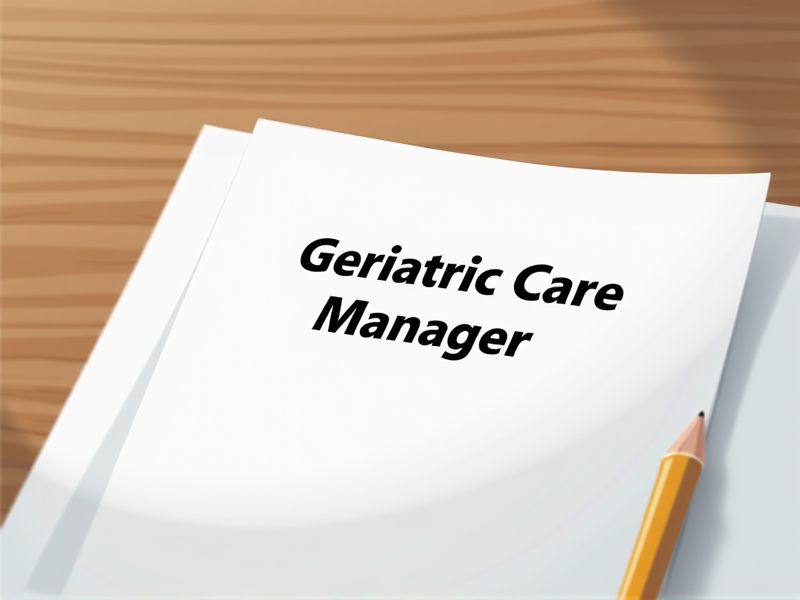
Geriatric Care Managers provide specialized services to address the complex needs of the elderly, which necessitates a deep understanding of aging-related health issues. Certifications equip them with essential skills in healthcare coordination and therapy management, ensuring they meet industry standards. These credentials enhance their credibility and professional development, directly impacting the quality of care provided. Here is a list of important certifications that could benefit a Geriatric Care Manager.
Certified Geriatric Care Manager (CGCM)
Certified Geriatric Care Managers (CGCM) possess specialized knowledge and skills specifically geared towards addressing the complex health and social needs of older adults. This certification ensures a standard of competency, instilling trust in families seeking assistance for the comprehensive care of aging loved ones. With the growing elder population, CGCMs help navigate the complexities of healthcare systems, legal issues, and community resources. Their role mitigates risks associated with mismanagement in elder care, consequently enhancing the quality of life for seniors.
Certified Senior Advisor (CSA)
A Certified Senior Advisor (CSA) possesses specialized knowledge about aging, allowing them to address the complex needs of older adults effectively. The CSA credential equips a geriatric care manager with the tools to provide holistic solutions that encompass medical, financial, and social aspects of elder care. This certification builds trust and credibility, reassuring families that their loved one's needs will be competently managed. Informed decision-making by a CSA enhances quality of life for seniors by integrating their personal wishes into individualized care plans.
Certified Case Manager (CCM)
Geriatric care often involves complex medical and social needs, creating a demand for CCMs who are skilled in navigating and coordinating comprehensive care plans. A CCM ensures all aspects of care, from medical to psychosocial, are addressed, leading to improved outcomes for the elderly. The certification demonstrates expertise and a standardized level of competency, which can enhance trust among clients and their families. Access to insurance and financial resources is often better managed by CCMs, making care more sustainable and effective.
Certified Dementia Practitioner (CDP)
The CDP designation equips a Geriatric Care Manager with specialized knowledge and skills to effectively address the complexities of dementia, a common issue among the elderly. As dementia progresses, communication and behavioral challenges often arise, making expertise crucial to maintaining the quality of care. Effective dementia care management enhances the quality of life for individuals and reduces the stress experienced by families. The credential reassures families and healthcare organizations of the Geriatric Care Manager's commitment to best practices in dementia care.
Certified Alzheimer's Care Manager (CACM)
The prevalence of Alzheimer's disease in the aging population has increased the demand for specialized care, highlighting the need for a Certified Alzheimer's Care Manager (CACM) in geriatric care. A CACM possesses specific knowledge and skills to address the complex challenges related to dementia, thereby enhancing the quality of life for both patients and families. By integrating evidence-based practices, a CACM ensures that the care provided is both effective and individualized. The presence of a CACM can reduce the overall healthcare burden by minimizing hospital admissions and improving patient outcomes.
Aging Life Care Professional (ALCP)
Aging Life Care Professionals (ALCP) bring specialized knowledge crucial for managing the complexities of geriatric care. Their expertise in assessment and care coordination ensures that older adults receive personalized and efficient health management. By addressing both the medical and psychosocial aspects, ALCPs reduce unnecessary hospitalizations and improve quality of life for seniors. Their involvement mitigates caregiver stress and helps families navigate the healthcare system effectively.
Certified Aging-in-Place Specialist (CAPS)
Certified Aging-in-Place Specialists (CAPS) provide expertise in modifying environments to ensure safety and accessibility, which directly impacts the quality of life for older adults under geriatric care management. They possess a deep understanding of the unique needs and challenges faced by the elderly, enabling geriatric care managers to implement more tailored and effective care plans. By incorporating CAPS' insights, geriatric care managers can enhance their support systems, reducing risks such as falls and promoting independence for aging individuals. Their specialized skills bridge gaps in knowledge regarding aging-in-place strategies, leading to more sustainable long-term solutions for elderly care.
Certified Medical Social Worker (CMSW)
Certified Medical Social Workers (CMSW) provide specialized expertise in navigating the complex healthcare needs of the elderly, ensuring personalized and effective care management. Their training enables them to address the psychosocial aspects of aging, which are crucial for developing comprehensive care plans tailored to individual seniors. CMSWs facilitate communication between healthcare providers, patients, and families, ensuring cohesive decision-making and advocacy for the elder's best interests. With an increasing aging population, the role of CMSWs in geriatric care management becomes even more vital, promoting improved quality of life and well-being for seniors.
Certified Health Education Specialist (CHES)
Certified Health Education Specialists (CHES) bring expertise in health promotion, which enhances the quality of life for the elderly. With demographic shifts showing an increase in the aging population, specialized knowledge is crucial in addressing unique health challenges faced by older adults. Geriatric care managers with CHES certification can design tailored health education programs, focusing on preventive measures and chronic disease management. Effective communication from certified specialists improves compliance with health regimens, reducing hospital readmissions among elderly patients.
Certified Hospice and Palliative Care Administrator (CHPCA)
Certified Hospice and Palliative Care Administrators bring specialized knowledge in managing end-of-life care, which enhances the quality of geriatric services. This expertise helps Geriatric Care Managers coordinate complex care plans for older adults with serious illnesses. The certification emphasizes evidence-based practices that improve patient outcomes and satisfaction. It also equips care managers with leadership skills necessary for navigating multidisciplinary teams in geriatric care settings.
Summary
You, as a Geriatric Care Manager obtaining certifications, can improve your credibility and attract more clients seeking assistance. Certifications demonstrate your commitment to professional development, which may enhance client trust and satisfaction. Your expertise in managing complex senior care issues might expand, leading to more efficient and effective care solutions. Employers may also value your certified skills, potentially resulting in career advancement opportunities.
